Related Research Articles
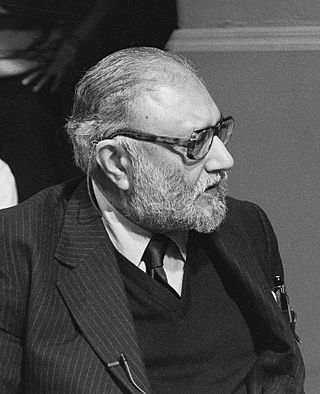
Mohammad Abdus Salam was a Pakistani theoretical physicist and a Nobel Prize laureate. He shared the 1979 Nobel Prize in Physics with Sheldon Glashow and Steven Weinberg for his contribution to the electroweak unification theory. He was the first Pakistani and the first Muslim from an Islamic country to receive a Nobel Prize in science and the second from an Islamic country to receive any Nobel Prize, after Anwar Sadat of Egypt.

Ben Roy Mottelson was an American-Danish nuclear physicist. He won the 1975 Nobel Prize in Physics for his work on the non-spherical geometry of atomic nuclei.

David Jonathan Gross is an American theoretical physicist and string theorist. Along with Frank Wilczek and David Politzer, he was awarded the 2004 Nobel Prize in Physics for their discovery of asymptotic freedom. Gross is the Chancellor's Chair Professor of Theoretical Physics at the Kavli Institute for Theoretical Physics (KITP) of the University of California, Santa Barbara (UCSB), and was formerly the KITP director and holder of their Frederick W. Gluck Chair in Theoretical Physics. He is also a faculty member in the UCSB Physics Department and is currently affiliated with the Institute for Quantum Studies at Chapman University in California. He is a foreign member of the Chinese Academy of Sciences.

Sidney David Drell was an American theoretical physicist and arms control expert.

Martin Karplus is an Austrian and American theoretical chemist. He is the Director of the Biophysical Chemistry Laboratory, a joint laboratory between the French National Center for Scientific Research and the University of Strasbourg, France. He is also the Theodore William Richards Professor of Chemistry, emeritus at Harvard University. Karplus received the 2013 Nobel Prize in Chemistry, together with Michael Levitt and Arieh Warshel, for "the development of multiscale models for complex chemical systems".

John Cromwell Mather is an American astrophysicist, cosmologist and Nobel Prize in Physics laureate for his work on the Cosmic Background Explorer Satellite (COBE) with George Smoot.
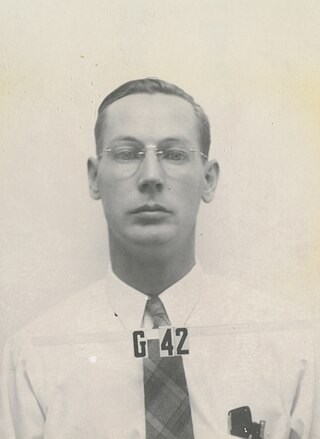
Donald William Kerst was an American physicist who worked on advanced particle accelerator concepts and plasma physics. He is most notable for his development of the betatron, a novel type of particle accelerator used to accelerate electrons.
Muhammad Shamsher Ali is a former president of the Bangladesh Academy of Sciences, former vice-chancellor of Southeast University and former founder vice-chancellor of Bangladesh Open University.
Abdullah Al Mamun is a Bangladeshi physicist who is a professor of physics at Jahangirnagar University, Dhaka, Bangladesh.
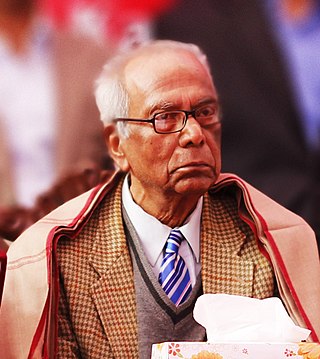
A. M. Harun-ar-Rashid was a Bangladeshi physicist and Professor of Physics at the University of Dhaka. He was the nephew of actor-writer Shamsuddin Abul Kalam.
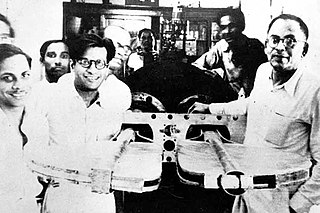
Basanti Dulal Nagchaudhuri was an Indian physicist and academic, and a scientific advisor to the Government of India. He is known as one of the pioneers of nuclear physics in India and for building the nation's first cyclotron at the University of Calcutta.
John C. Wheatley was an American experimental physicist who worked on quantum fluids at low and very low temperatures.

Hiranmay Sen Gupta, Bengali: হিরন্ময় সেন গুপ্ত, was a Bangladeshi physicist who specialised in nuclear physics. In a career spanning five decades he published over 200 research papers and was made a fellow of Bangladesh Academy of Sciences in 1977.

Asoke Nath Mitra was an Indian theoretical physicist. He was a lifetime professor emeritus at Delhi University. He is known for his work in nuclear physics, particle physics and quantum field theory and in particular, for his fundamental contributions in obtaining the exact solution of the nucleon 3- body problem with separable potentials which led to the few nucleon studies, quark-recoil effect, development of an integrated dynamics of 2- and 3- body systems from nucleons to quarks as well as for the development of quark dynamics and relativistic quark models for hadrons in the Bethe-Salpeter framework. He was awarded the Shanti Swarup Bhatnagar Prize in 1969.
Marc Kamionkowski is an American theoretical physicist and currently the William R. Kenan, Jr. Professor of Physics and Astronomy at Johns Hopkins University. His research interests include particle physics, dark matter, inflation, the cosmic microwave background and gravitational waves.
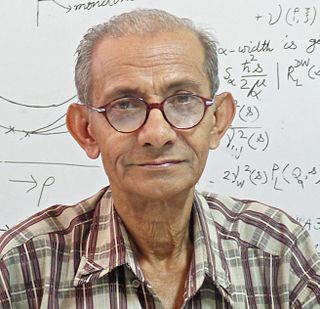
Arun Kumar Basak is a Bangladeshi physicist. He is Professor Emeritus in the Department of Physics, University of Rajshahi.
Bangladesh Academy of Sciences is an academic forum for Bangladeshi scientists and technologists. Established in 1973, it aims to fulfill the role of promoting research and development of sciences in Bangladesh.
John R. Tucker was an American physicist who made several contributions to the fields of electronics, physics and microwave theory, known for generalizing the microwave mixer theory and presenting the body of work, known as the "Tucker theory", and for his fundamental theoretical contributions which resulted into various advancements in experimental Submillimeter astronomy. He is also credited with laying down some of the technological foundations for making practical Quantum computing possible.
M. Zahid Hasan is the Eugene Higgins Professor of Physics at Princeton University. His primary research area is quantum physics and quantum topology.
David Kelly Campbell is an American theoretical physicist and academic leader. His research has spanned high energy physics, condensed matter physics and nonlinear dynamics. He also served as Physics Department Head at the University of Illinois at Urbana–Champaign, Dean of the College Engineering at Boston University, and Boston University Provost.
References
- 1 2 "BARY MALIK IN MEMORIAM". Southern Illinois University. Retrieved August 3, 2016.
- ↑ "Professor Fazley Bary Malik". Bangladesh Academy of Sciences. Archived from the original on August 18, 2016. Retrieved August 3, 2016.
- 1 2 "2007 John Wheatley Award Recipient". American Physical Society. Retrieved August 3, 2016.
- 1 2 3 Haider, Quamrul (July 8, 2014). "Professor Bary Malik: A man with a brilliant mind". The Daily Star. Retrieved August 3, 2016.
- ↑ "Memorial set for former SIU professor". The Southern Illinoisan. September 6, 2014. Retrieved August 3, 2016.